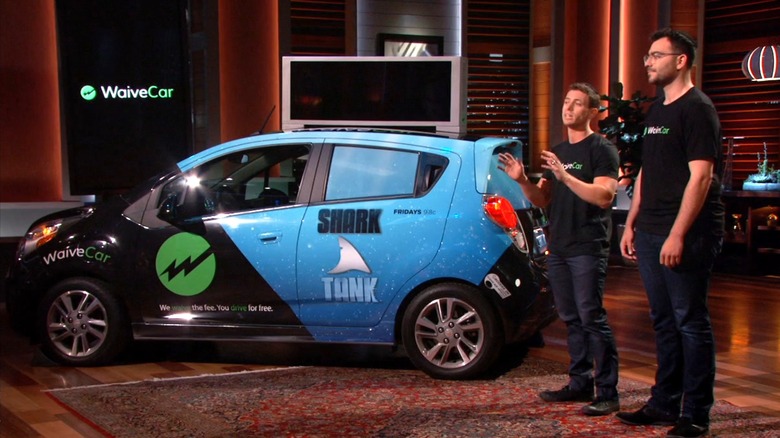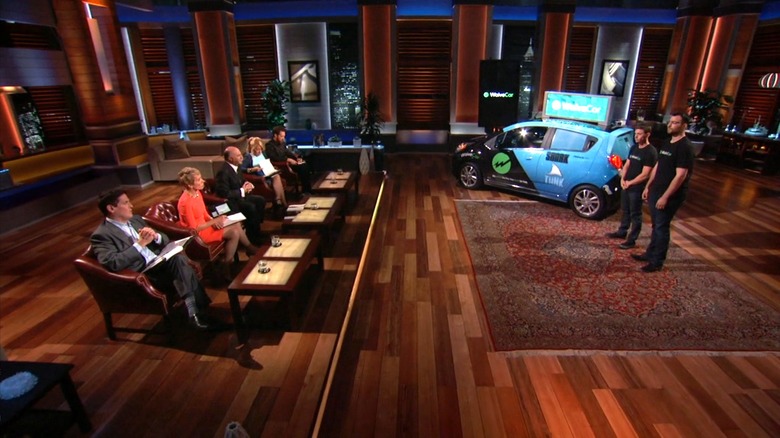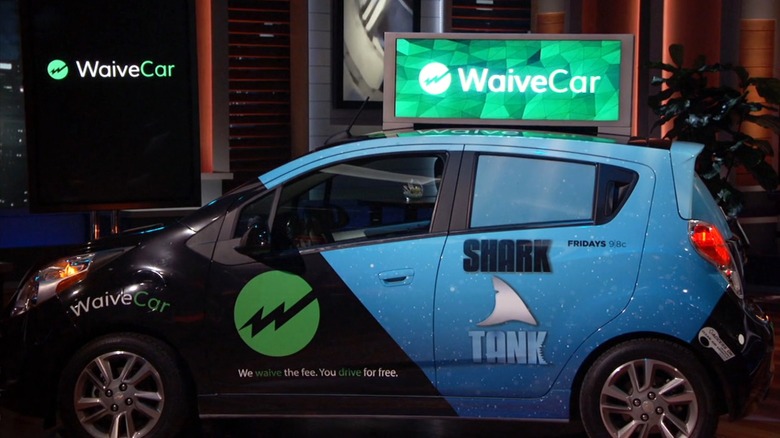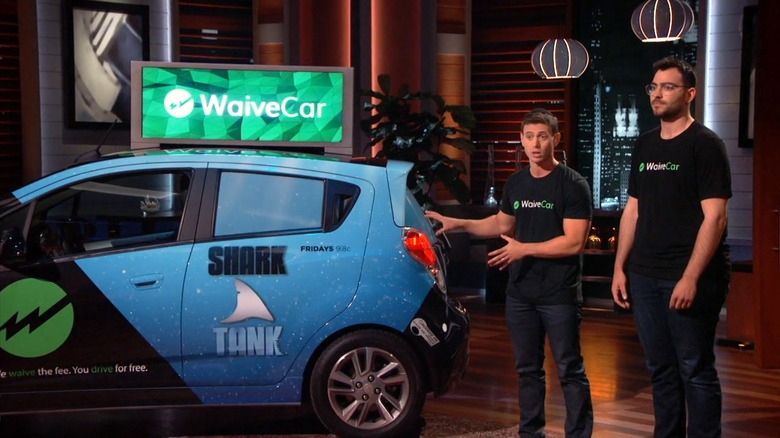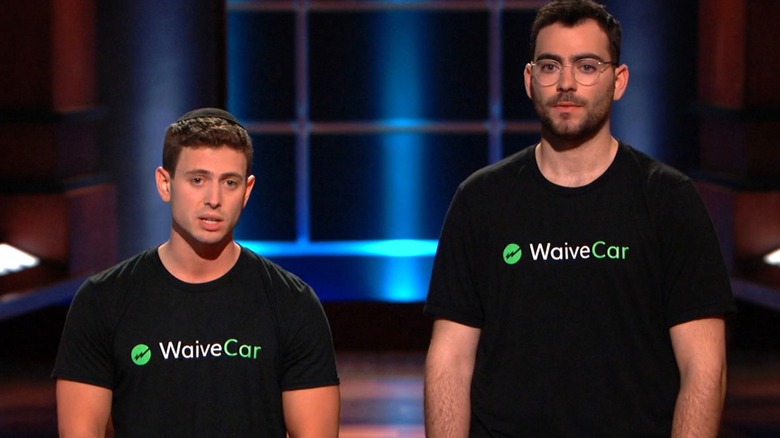What Really Came Of WaiveCar From Shark Tank?
We may receive a commission on purchases made from links.
Season 9 of "Shark Tank" saw quite a few interesting pitches, from the camping-friendly Radiate to the disastrous Trippie App. And in Episode 7 of that season, we were introduced to WaiveCar, a car-sharing service. Not only was it free, but it was also all-electric, running a fleet of Hyundai IONIQs that could be rented by the public. WaiveCar was founded in 2016 by entrepreneurs Zoli Honig and Isaac Deutsch, who launched a pilot scheme in Santa Monica.
You might be wondering how a free car rental service ended up on "Shark Tank," where the idea is to make money for investors. First, it's important to note that the service was free for the first two hours; after that, renting the cars cost $5.99 per hour. Second, the cars had electronic billboards on the top that advertisers could buy. So the business was making money. The cars were parked in spaces that were free for electric vehicles in Santa Monica, and the city also has a lot of charging points for electric cars.
The plan was working. In the first month of operation, WaiveCar had 3,000 users in the Santa Monica area and had signed a deal with Hyundai to supply the vehicles. The company had been in business for just five months when founders Honig and Deutsch appeared on "Shark Tank" looking for investment.
What happened to WaiveCar on Shark Tank?
Zoli Honig and Isaac Deutsch went on "Shark Tank" to ask for $500,000 in return for 2% equity in WaiveCar. Despite having only been in business a short time, WaiveCar was known to one of the Sharks — Lori Greiner had seen it in action. However, this didn't persuade her to invest, as she believed the idea was too easy to copy. One Shark down.
Sharks Mark Cuban and Chris Sacca also declined to invest. Cuban said that the advertising space was already saturated, while Sacca didn't believe the car-sharing service was doing anything revolutionary. Two Sharks were left — Barbara Corcoran and Kevin O'Leary.
O'Leary offered a loan of $500,000 for 12% interest plus 4% equity. He also wanted to be able to use any unsold advertising space on the cars. Corcoran offered $500,000 for 10% equity, a far higher share than Honig and Deutsch had been hoping to give for that amount. They countered with an offer of 5% equity, which Corcoran turned down. The founders then made O'Leary a counteroffer: a loan of $500,000 with 12% interest, 1% equity, and 80% off of any unsold advertising space. After some back and forth, they settled on 2% equity, with the loan and advertising terms remaining the same. WaiveCar had a deal.
What happened to WaiveCar after Shark Tank?
After "Shark Tank" aired, WaiveCar began its expansion. This started with the company reportedly sending 19 vehicles to California State University, Los Angeles that could be used around the campus and the local area. Shark Kevin O'Leary put WaiveCar on his website under his list of investments, boosting the company's profile.
In 2019, Cal State won an award for its collaboration with WaiveCar. In the 2019 Energy Efficiency and Sustainability Best Practice Awards, the car-sharing program was recognized as contributing to the university's commitment to sustainability. In April 2019, WaiveCar announced a shift in focus from daily rentals to rentals with a three-day minimum duration as well as monthly rentals. The new era was called WaiveWork, though the cars were still offered for personal use. The company also began to rent cars to local rideshare drivers.
The focus of WaiveCar was on the great value that it offered to its customers. Longer-term rentals were available for $22 per day, and another benefit was avoiding high gas prices.
Is WaiveCar still in business?
In January 2020, WaiveCar ceased operations in Los Angeles. Signs around the Cal State campus said that the company was temporarily out of service due to an insurance switch, but the cars never returned. The university shut down in March of that year due to the COVID-19 pandemic, and according to Zoli Honig, it had a devastating effect on the company's operations.
"COVID completely decimated WaiveCar," he wrote on LinkedIn. "If I had been running my EdTech business during the pandemic, when online learning skyrocketed, the story might've been very different. Instead, WaiveCar was in the wrong industry, in the wrong city, at the wrong time."
WaiveCar's Twitter account has not been updated since October 2019 and its Facebook and Instagram accounts both became REEFDrive. The change was to promote a new partnership between companies REEF and Arcimoto that made unusual electric utility vehicles available for rent in the Santa Monica area. However, the accounts haven't been active since 2022. The websites for WaiveCar and REEFDrive are not in service and do not have apps available for download.
What's next for the WaiveCar founders?
The founders of WaiveCar both moved on to work at REEFDrive. According to LinkedIn, Zoli Honig joined the company in March 2020, with Isaac Deutsch following in December 2020. Honig was VP of special projects for three years and left the company in March 2023. Deutsch was Head of real estate for a time, but left REEFDrive in August 2022. The company is no longer operating.
In March 2023, Honig founded Short Form Media, based in Miami, and is currently the CEO. In a video posted on the company's Instagram, Honig explains that Short Form Media is a full-service social media agency that specializes in creating viral content. Deutsch's whereabouts are less clear — and deliberately so, it seems. On his LinkedIn, he has had Stealth Startup listed as his place of work since leaving REEFDrive. A stealth startup flies under the radar, avoiding public attention for the first few years. Deutsch may well pop back up soon enough.
"Shark Tank" is available for purchase on Prime Video.
